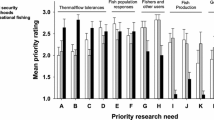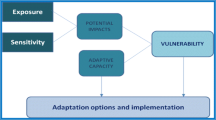Abstract
The ability of resource-dependent communities to adapt to climate change depends in part on their perceptions and prioritization of specific climate-related threats. In the Maine lobster fishery, which is highly vulnerable to warming water associated with climate change, we found a strong majority (84%) of fishers viewed warming water as a threat, but rank its impacts lower than other drivers of change (e.g., pollution). Two-thirds believed they will be personally affected by warming waters, but only half had plans to adapt. Those with adaptation plans demonstrated fundamentally different views of human agency in this system, observing greater anthropogenic threats, but also a greater ability to control the fishery through their own actions on the water and fisheries management processes. Lack of adaptation planning was linked to the view that warming waters result from natural cycles, and the expectation that technological advancements will help buffer the industry from warming waters.




Similar content being viewed by others
Explore related subjects
Discover the latest articles and news from researchers in related subjects, suggested using machine learning.References
Acheson, J.M. 2003. Capturing the commons: Devising institutions to manage the maine lobster industry. Hanover: University Press of New England.
Acheson, J., and R. Gardner. 2014. Fishing failure and success in the Gulf of Maine: lobster and groundfish management. Maritime Studies 13: 8. https://doi.org/10.1186/2212-9790-13-8.
Acheson, J. 2011. Coming up empty: Management failure of the New England groundfishery. Maritime Studies 10: 57–86.
Adger, W.N. 2009. Social capital, collective action, and adaptation to climate change. Economic Geography 79: 387–404. https://doi.org/10.1111/j.1944-8287.2003.tb00220.x.
Adger, W.N., and K. Vincent. 2005. Uncertainty in adaptive capacity. Comptes Rendus—Geoscience 337: 399–410. https://doi.org/10.1016/j.crte.2004.11.004.
Adger, W.N., T.P. Hughes, C. Folke, S.R. Carpenter, and J. Rockström. 2005. Social-ecological resilience to coastal disasters. Science 309: 1036–1039. https://doi.org/10.1126/science.1112122.
Barange, M., G. Merino, J.L. Blanchard, J. Scholtens, J. Harle, E.H. Allison, J.I. Allen, J. Holt, et al. 2014. Impacts of climate change on marine ecosystem production in societies dependent on fisheries. Nature Climate Change 4: 211–216. https://doi.org/10.1038/nclimate2119.
Barnes-Mauthe, M., S. Arita, S.D. Allen, S.A. Gray, and P.S. Leung. 2013. The influence of ethnic diversity on social network structure in a common-pool resource system: Implications for collaborative management. Ecology and Society. https://doi.org/10.5751/ES-05295-180123.
Belhabib, D., V.W.Y. Lam, and W.W.L. Cheung. 2016. Overview of West African fisheries under climate change: Impacts, vulnerabilities and adaptive responses of the artisanal and industrial sectors. Marine Policy 71: 15–28. https://doi.org/10.1016/j.marpol.2016.05.009.
Berkes, F. 2009. Evolution of co-management: Role of knowledge generation, bridging organizations and social learning. Journal of Environmental Management. https://doi.org/10.1016/j.jenvman.2008.12.001.
Biernacki, P., and D. Waldorf. 1981. Snowball sampling: Problems and techniques of chain referral sampling. Sociological Methods & Research 10: 141–163. https://doi.org/10.1177/004912418101000205.
Cinner, J.E., C. Huchery, C.C. Hicks, T.M. Daw, N. Marshall, A. Wamukota, and E.H. Allison. 2015. Changes in adaptive capacity of Kenyan fishing communities. Nature Climate Change 5: 872–876. https://doi.org/10.1038/nclimate2690.
Cinner, J.E., W.N. Adger, E.H. Allison, M.L. Barnes, K. Brown, P.J. Cohen, S. Gelcich, C.C. Hicks, et al. 2018. Building adaptive capacity to climate change in tropical coastal communities. Nature Climate Change 16: 293–303. https://doi.org/10.1038/s41558-017-0065-x.
Criddle, K.R. 2012. Adaptation and maladaptation: Factors that influence the resilience of four Alaskan fisheries governed by durable entitlements. ICES Journal of Marine Science 69: 1168–1179. https://doi.org/10.1093/icesjms/fss085.
Dietz, T., E. Ostrom, and P.C. Stern. 2003. The struggle to govern the commons. Science 302: 1907–1912. https://doi.org/10.1007/978-0-387-73412-5_40.
Drew, J.A. 2005. Use of traditional ecological knowledge in marine conservation. Conservation Biology 19: 1286–1293. https://doi.org/10.1016/j.joms.2015.09.014.
Engle, N.L. 2011. Adaptive capacity and its assessment. Global Environmental Change 21: 647–656. https://doi.org/10.1016/j.gloenvcha.2011.01.019.
Finkbeiner, E.M. 2015. The role of diversification in dynamic small-scale fisheries: Lessons from Baja California Sur, Mexico. Global Environmental Change 32: 139–152. https://doi.org/10.1016/j.gloenvcha.2015.03.009.
Folke, C., S. Carpenter, T. Elmqvist, L. Gunderson, C.S. Holling, and B. Walker. 2002. Resilience and sustainable development: Building adaptive capacity in a world of transformations. Ambio 31: 437–440. https://doi.org/10.1639/0044-7447(2002)031%5b0437:RASDBA%5d2.0.CO;2.
Folke, C. 2006. Resilience: The emergence of a perspective for social-ecological systems analyses. Global Environmental Change 16: 253–267. https://doi.org/10.1016/j.gloenvcha.2006.04.002.
Gallopín, G.C. 2006. Linkages between vulnerability, resilience, and adaptive capacity. Global Environmental Change 16: 293–303. https://doi.org/10.1016/j.gloenvcha.2006.02.004.
Grabowski, J.H., E.J. Clesceri, A.J. Baukus, J. Gaudette, M. Weber, and P.O. Yund. 2010. Use of herring bait to farm lobsters in the Gulf of Maine. PLoS ONE 5: e10188. https://doi.org/10.1371/journal.pone.0010188.
Gray, S. A., S. Gray, L. J. Cox, and S. Henly-Shepard. 2013. Mental Modeler: A fuzzy-logic cognitive mapping modeling tool for adaptive environmental management. In Proceedings of the annual Hawaii international conference on system sciences, 965–973. Wailea, Maui, HI. https://doi.org/10.1109/hicss.2013.399.
Gray, S.A., S. Gray, J.L. de Kok, A.E.R. Helfgott, B. O’Dwyer, R. Jordan, and A. Nyaki. 2015. Using fuzzy cognitive mapping as a participatory approach to analyze change, preferred states, and perceived resilience of social-ecological systems. Ecology and Society 20: 11. https://doi.org/10.5751/ES-07396-200211.
Henry, A.M., and T.R. Johnson. 2015. Understanding social resilience in the Maine lobster industry. Marine and Coastal Fisheries 1: 33–43. https://doi.org/10.1080/19425120.2014.984086.
Holling, C.S. 1973. Resilience and stability of ecological systems. Annual Review of Ecology and Systematics 4: 1–23. https://doi.org/10.1146/annurev.es.04.110173.000245.
Johannes, R.E., M.M.R. Freeman, and R.J. Hamilton. 2000. Ignore fishers’ knowledge and miss the boat. Fish and Fisheries 1: 257–271. https://doi.org/10.1111/j.1467-2979.2000.00019.x.
Johnson, T.R., and M.D. Mazur. 2018. A mixed method approach to understanding the graying of Maine’s lobster fleet. Bulletin of Marine Science 94: 1185–1199. https://doi.org/10.5343/bms.2017.1108.
Kaplan, I.M., and B.J. McCay. 2004. Cooperative research, co-management and the social dimension of fisheries science and management. Marine Policy 28: 257–258. https://doi.org/10.1016/j.marpol.2003.08.003.
Le Bris, A., K.E. Mills, R.A. Wahle, Y. Chen, M.A. Alexander, A.J. Allyn, J.G. Schuetz, J.D. Scott, et al. 2018. Climate vulnerability and resilience in the most valuable North American fishery. Proceedings of the National Academy of Sciences 115: 1831–1836. https://doi.org/10.1073/pnas.1711122115.
Marshall, N.A., and P.A. Marshall. 2007. Conceptualizing and operationalizing social resilience within commercial fisheries in northern Australia. Ecology and Society. https://doi.org/10.5751/es-01940-120101.
Marshall, N.A., D.M. Fenton, P.A. Marshall, and S.G. Sutton. 2007. How resource dependency can influence social resilience within a primary resource industry. Rural Sociology 72: 359–390. https://doi.org/10.1526/003601107781799254.
McClanahan, T.R., and J.E. Cinner. 2011. Adapting to a changing environment: Confronting the consequences of climate change. Oxford: Oxford University Press.
Mills, K., A. Pershing, C. Brown, Y. Chen, F.-S. Chiang, D.S. Holland, S. Lehuta, J.A. Nye, et al. 2013. Fisheries management in a changing climate: Lessons from the 2012 ocean heat wave in the northwest Atlantic. Oceanography 26: 191–195. https://doi.org/10.5670/oceanog.2010.11.COPYRIGHT.
Mortreux, C., and J. Barnett. 2017. Adaptive capacity: Exploring the research frontier. Wiley Interdisciplinary Reviews: Climate Change 8: 1–12. https://doi.org/10.1002/wcc.467.
Nelson, D.R., W.N. Adger, and K. Brown. 2007. Adaptation to environmental change: Contributions of a resilience framework. Annual Review of Environment and Resources 32: 395–419. https://doi.org/10.1146/annurev.energy.32.051807.090348.
Özesmi, U., and S. Özesmi. 2004. Ecological models based on people’s knowledge: A multi-step fuzzy cognitive mapping approach. Ecological Modeling 176: 43–64.
Rosenberg, A.A., W.J. Bolster, K.E. Alexander, W.B. Leavenworth, A.B. Cooper, and M.G. McKenzie. 2005. The history of ocean resources: Modeling cod biomass using historical records. Frontiers in Ecology and the Environment 3: 78–84. https://doi.org/10.2307/3868514.
Shields, J.D. 2013. Complex etiologies of emerging diseases in lobsters (Homarus americanus) from Long Island Sound. Canadian Journal of Aquatic Science 70: 1576–1587. https://doi.org/10.1139/cjfas-2013-0050.
Silvano, R.A.M., and J. Valbo-Jørgensen. 2008. Beyond fishermen’s tales: Contributions of fishers’ local ecological knowledge to fish ecology and fisheries management. Environment, Development and Sustainability 10: 657. https://doi.org/10.1007/s10668-008-9149-0.
Singer, L.T., and D.S. Holland. 2008. Taking the pulse of the lobster industry: A socioeconomic survey of New England lobster fishermen. Portland, ME: Gulf of Maine Research Institute.
Smit, B., and J. Wandel. 2006. Adaptation, adaptive capacity and vulnerability. Global Environmental Change 16: 282–292. https://doi.org/10.1016/j.gloenvcha.2006.03.008.
Stedman, R.C., J.R. Parkins, and T.M. Beckley. 2004. Resource dependence and community well-being in rural Canada. Rural Sociology 69: 213–234. https://doi.org/10.1526/003601104323087589.
Steneck, R.S., T.P. Hughes, J.E. Cinner, W.N. Adger, S.N. Arnold, F. Berkes, S.A. Boudreau, K. Brown, et al. 2011. Creation of a gilded trap by the high economic value of the Maine lobster fishery. Conservation Biology 25: 904–912. https://doi.org/10.1111/j.1523-1739.2011.01717.x.
Stern, M.J., and K.J. Coleman. 2015. The multidimensionality of trust: Applications in collaborative natural resource management. Society and Natural Resources 28: 117–132.
Trotter, B. 2018. Scientists say the Maine lobster boom won’t last. Here are the fisheries coming next. Bangor Daily News, May 12.
Tlusty, M.F., and A. Metzler. 2012. Relationship between temperature and shell disease in laboratory populations of juvenile American lobsters (Homarus americanus). Journal of Shellfish Research 31: 533–541. https://doi.org/10.2983/035.031.0213.
Wahle, R.A., C. Bergeron, J. Tremblay, C. Wilson, V. Burdett-Coutts, M. Comeau, R. Rochette, P. Lawton, et al. 2013. The geography and bathymetry of American lobster benthic recruitment as measured by diver-based suction sampling and passive collectors. Marine Biology Research 9: 42–58. https://doi.org/10.1080/17451000.2012.727428.
Wahle, R.A., L. Dellinger, S. Olszewski, and P. Jekielek. 2015. American lobster nurseries of southern New England receding in the face of climate change. ICES Journal of Marine Science 72: i69–i78. https://doi.org/10.1093/icesjms/fsv093.
Waller, J.D., R.A. Wahle, H. McVeigh, and D.M. Fields. 2017. Linking rising pCO2 and temperature to the larval development and physiology of the American lobster (Homarus americanus). ICES Journal of Marine Science 74: 1210–1219. https://doi.org/10.1093/icesjms/fsw154.
Waring, T., and J. Acheson. 2018. Evidence of cultural group selection in territorial lobstering in Maine. Sustainability Science 13: 21–34. https://doi.org/10.1007/s11625-017-0501-x.
Wilson, J., L. Yan, and C. Wilson. 2007. The precursors of governance in the Maine lobster fishery. Proceedings of the National Academy of Sciences 104: 15212–15217. https://doi.org/10.1073/pnas.0702241104.
Acknowledgements
This research was supported by the NOAA Climate Program Office (Grant #NA15OAR4310135) and the Colby College Environmental Studies Program. The authors would like to thank Colby College students Ryan Clemens, Katie Chicojay, Clea Harrelson, Robin Lewis, Sara LoTemplio, Ella McDonald, Juila Nelson, Barlow Peelle, Tucker Plante, Joshua Reed, Kaya Williams, Emma Wood, and Olivia Wright for their help with data collection and analysis.
Author information
Authors and Affiliations
Corresponding author
Additional information
Publisher's Note
Springer Nature remains neutral with regard to jurisdictional claims in published maps and institutional affiliations.
Rights and permissions
About this article
Cite this article
McClenachan, L., Scyphers, S. & Grabowski, J.H. Views from the dock: Warming waters, adaptation, and the future of Maine’s lobster fishery. Ambio 49, 144–155 (2020). https://doi.org/10.1007/s13280-019-01156-3
Received:
Revised:
Accepted:
Published:
Issue Date:
DOI: https://doi.org/10.1007/s13280-019-01156-3




